Have you ever asked yourself why owning a horse has a tendency to become such an expensive hobby? Everyone who’s thought of getting a horse has at some point worried about the costs of owning a horse, and seeing where the money goes on a lifetime and monthly basis can sometimes help in making the right decision for you — and of course the horse.
I’ve owned and cared for horses my entire life, and for anyone who is wondering what to expect as far as expenses that come with owning a horse goes, I have summed up the top reasons why horses are so expensive below, along with amount estimations or averages on the actual costs involved.
- 1. The Initial Purchase Cost
- 2. The Cost of Boarding
- 3. The Cost of Pasture
- 4. Feed Costs – Roughage
- 5. Feed Costs – Grain, Concentrates & Supplements
- 6. The Cost of Water
- 7. Bedding
- 8. Farrier, Trimming, and Shoeing Costs
- 9. Veterinary Care – Vaccination & Deworming Costs
- 10. Veterinary Care – Dentistry Costs
- 11. Veterinary Care – Diseases and Injuries
- 12. Insurance Costs
- 13. Tack
- 14. Equipment Costs
- 15. Riding Lessons & Training Costs
- 16. Competing / Racing
- 17. Horse Trailer
- 18. Massage, Chiropractic Costs
- 19. Taking Care of Your Horse Takes Time, and Time is Money
- Conclusion
Example of basics costs for keeping a horse:
| Monthly | Yearly | |
|---|---|---|
| Boarding (self care) | $100 | $1,200 |
| Hay | $150 | $1,800 |
| Grain/concentrates/supplements | $100 | $1,200 |
| Bedding | $100 | $1,200 |
| Farrier | $100 | $1,200 |
| Veterinary preventive care | $40 | $480 |
| Insurance | $13 | $156 |
| Sum | $603 | $7,236 |
Note that these are just some examples of basic costs of keeping a horse. They do not include cost for equipment, training, service, etc. To dig a bit deeper, read on to find out even more types of costs and reasons why horses are so expensive.
1. The Initial Purchase Cost
Buying a horse may seem like the most expensive part of owning a horse, but that’s usually not the truth. Although horses can have high price tags, in most cases the cost of keeping the horse will exceed the purchase price.
The cost of buying an average horse can range anywhere from $500 to $15,000.
The price of a horse depends on many factors, such as its age, breed, and training. If you’re looking to buy a horse for competition purposes, you can expect to pay more than if you’re simply looking for a horse to ride for pleasure.
A well-trained and talented competition horse or racehorse costs from $10,000 up to millions of dollars.
2. The Cost of Boarding
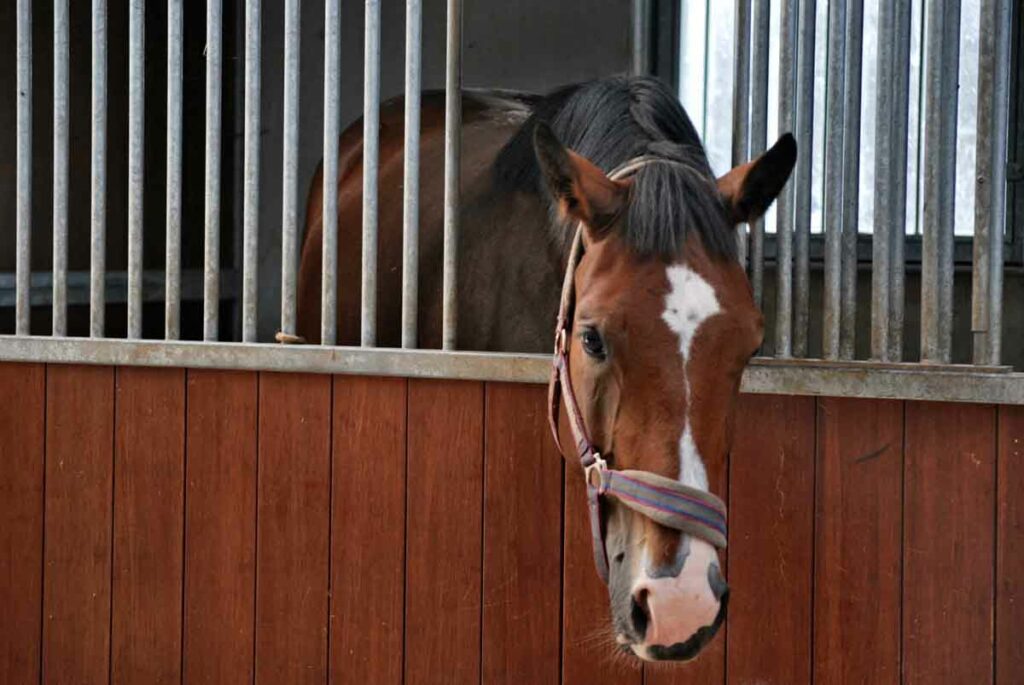
If you don’t own a stable, boarding will account for a large part of the cost of having a horse. The cost of stabling can vary greatly depending on how much is included in the price, what services are offered, where the stable is located, what facilities are available on the premises, and so on.
- The lowest boarding price you will get is a Self-care board, where no service, care, or feed is included and the cost starts typically from $100.
- The second cheapest boarding price is Partial-board care, where part of service and/or feed is included to varying degrees depending on the contract. The cost for partial-board care is usually in the range of $200-400
- The most expensive boarding is Full Care Boarding where everything is included. The price for full care boarding can range from $700 to $1500
When stabling a horse, you need to carefully compare what is included in different stable rents before deciding which option is best for you. If you work full-time and are a parent with young children, you may be better off paying a little extra for services such as feeding your horse and taking it in and out of the paddock/stable.
On the other hand, if you have a lot of time on your hands, you may benefit greatly from doing most of the work around your horse yourself.
3. The Cost of Pasture
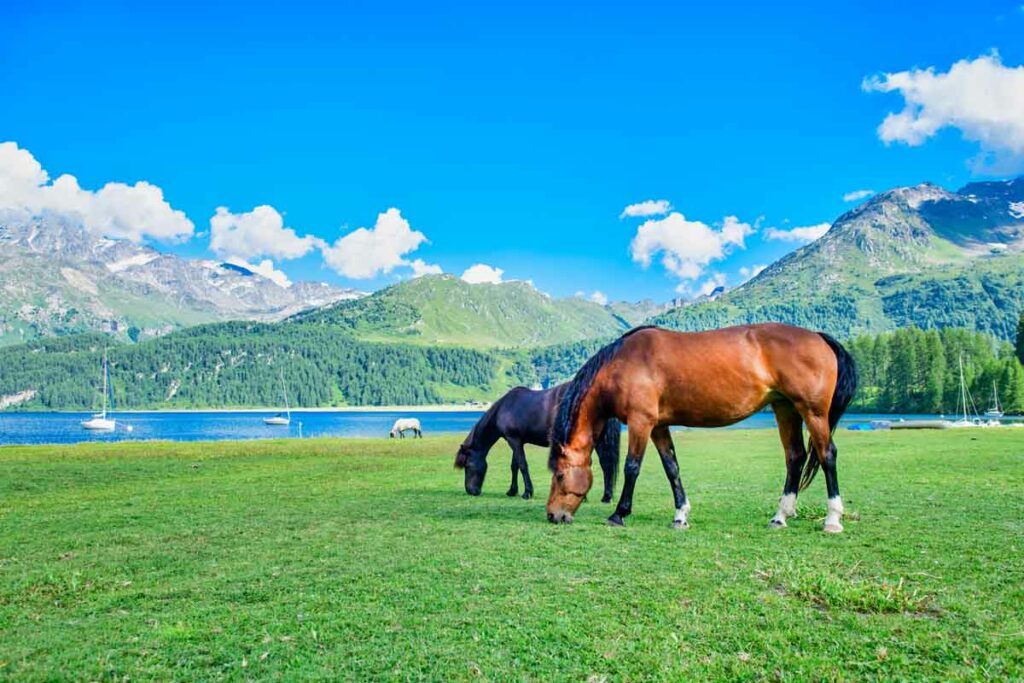
If you do not own land, you must also pay for the horse to be pastured. It costs money to put up fences, electricity, clean water, and supervision if necessary.
Normally, pasture with care costs around $200 per month, but this can vary a lot depending on where the bait is, how big it is and what quality it is.
When choosing a pasture, don’t always go for the cheapest option, but look at what suits you and your horse. It should be the right pasture nutritionally for your horse.
It is not healthy for your horse to get too fat, but it is not good either if it cannot feed itself on the grass. It is important that the horse has a good herd with friends on the pasture so that it is comfortable and enjoys its time out in the field.
4. Feed Costs – Roughage
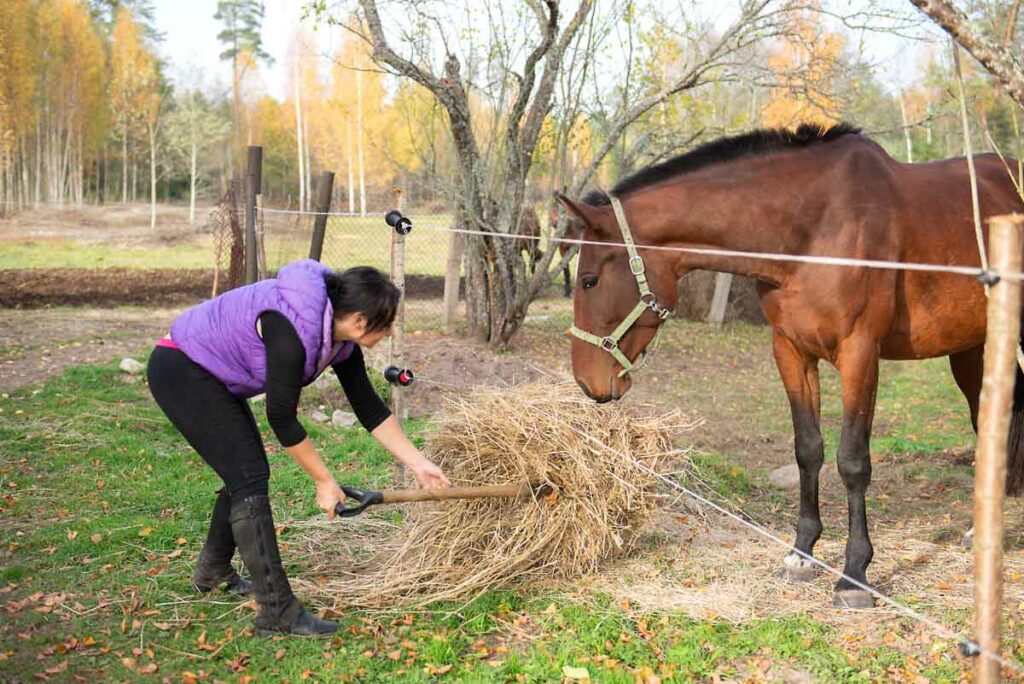
Most of the horse’s diet should consist of roughage; its cost, therefore, becomes a large part of the cost of keeping a horse. The price of hay varies according to variety, quality, and size.
However, one should expect a price of around $5 and above per day (or around $150 and above per month) for a medium-sized horse. It is not advisable to always look for the cheapest feed as it may be of poor quality.
It is important that the feed has both good hygienic and nutritional quality, otherwise, it can be even more expensive for you. Poor hygienic quality can lead to the horse becoming ill with expensive veterinary costs.
Inappropriate nutritional content will also be expensive as you will have to complement it with concentrates or supplements which are usually more expensive than comparable hay.
5. Feed Costs – Grain, Concentrates & Supplements
The need for concentrates depends on the values of the horse’s roughage and the horse’s needs. If concentrate like grain is needed, the cost is often between $50-150 per month.
Then you also have to add minerals and vitamin supplements depending on the content of the roughage and concentrates.
6. The Cost of Water
Horses usually drink between 30-80 liters of water per day and this also becomes a cost that can amount to about $20 per month.
7. Bedding
The cost of the bedding depends on whether you use wood shavings, straw, or something else, but you can expect it to cost between $50 and $150 a month. As with hay, it is important that the bedding is of good hygienic quality, otherwise, it can affect the horse negatively in the form of respiratory diseases, gastrointestinal effects, etc. So do not always look primarily at the price tag but instead at what is both healthy and affordable.
8. Farrier, Trimming, and Shoeing Costs
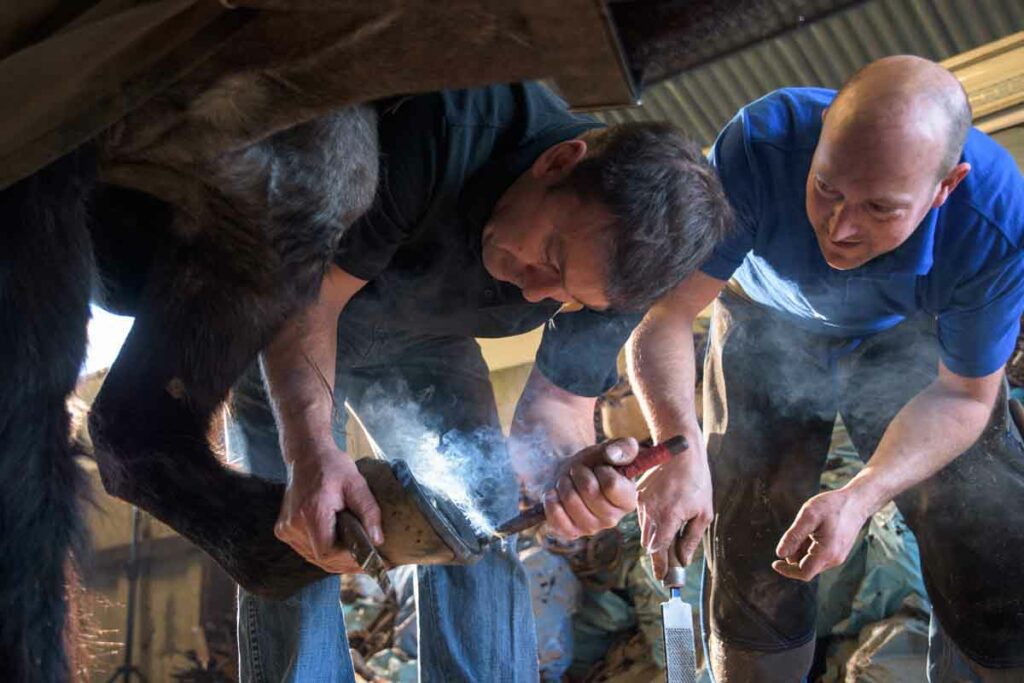
The horse needs to see a good farrier on a regular basis and the cost of this varies depending on whether the horse is just being worked on or whether it also needs shoeing.
Depending on the conditions and intervals, the cost lands at about $250 to $2,000 per year. It is cheaper if the horse is only trimmed and more expensive if the horse needs frequent shoeing and possibly special shoeing.
9. Veterinary Care – Vaccination & Deworming Costs
Vaccinations help protect horses from diseases and illnesses. They typically cost between $100 and $250 per year. The cost of vaccination depends on the diseases you need to vaccinate against. This in turn depends on how and where you keep your horse.
You will also need to take regular fecal samples and check the parasite status of the horse and deworm if necessary.
This cost will depend on the number of parasites and which deworming agent needs to be used and how frequently. But expect a cost of at least $100 a year.
10. Veterinary Care – Dentistry Costs
The horse needs regular dental care and this cost depends on the horse’s age and dental status. Normally, the horse’s mouth needs to be checked by a dental trained veterinarian once or twice a year. Younger horses may have problems with tooth wear and therefore more frequent intervals. Older horses may have problems with tooth loosening and feed impaction which also needs to be treated more frequently. Expect a cost of at least about $200-300 per year for equine dental care.
11. Veterinary Care – Diseases and Injuries
In addition to the above preventive veterinary treatments, the horse may also suffer injuries and accidents. Costs for this are very difficult to predict but you must always have a buffer or good insurance to cover this if necessary.
It may also be a good idea to have regular vet checks to reduce the risk of undetected low-grade problems which then become more difficult and expensive to treat. One of the most common veterinary costs is veterinary visits due to lameness.
Other common cause of expensive veterinary bills is colic, laminitis, and wound injuries. Wounds are particularly costly if they penetrate a joint and are usually very expensive as they require surgery and hospitalization.
Colic can also require abdominal surgery which is extremely costly as is aftercare. Fractures also cause high veterinary bills.
12. Insurance Costs
The cost of insuring a horse can vary enormously depending on the value of the horse, its use, and the extent of the insurance. An insurance policy can consist of several parts and cover different things e.g. Mortality Insurance, Loss of Use Insurance, and Medical & Surgical Insurance.
Generally, you should expect to pay at least $150 per year, but this amount will be considerably higher if you want comprehensive insurance for a very valuable horse.
13. Tack
If the horse is to be ridden, equipment will be needed. The amount of money you can spend on horse equipment is infinite and therefore no amount will be given here. Bridles and bits can be bought for smaller sums but saddles are a more expensive purchase.
Expect to pay at least $500 for a cheaper type of saddle. However, sometimes cheap saddles with poor fit can be costly if the horse develops back problems. So spend some time and money trying out a saddle that suits both you and your horse.
Of course, if you buy used saddles it will be cheaper and if you buy an exclusive brand it can be incredibly expensive so we can have a range of between $100 and $10,000 in the price for a saddle.
Finally, you have to add the cost of the saddle pad, stirrups, and girth.
14. Equipment Costs
In addition to riding gear, the horse needs a variety of equipment. But here it varies a lot depending on the needs of you and your horse and the brands you choose. Blankets are a big expense for many as these can cost a lot and wear a lot. The rider’s clothing and equipment, such as helmets, gloves, spurs, and boots are also additional costs.
15. Riding Lessons & Training Costs
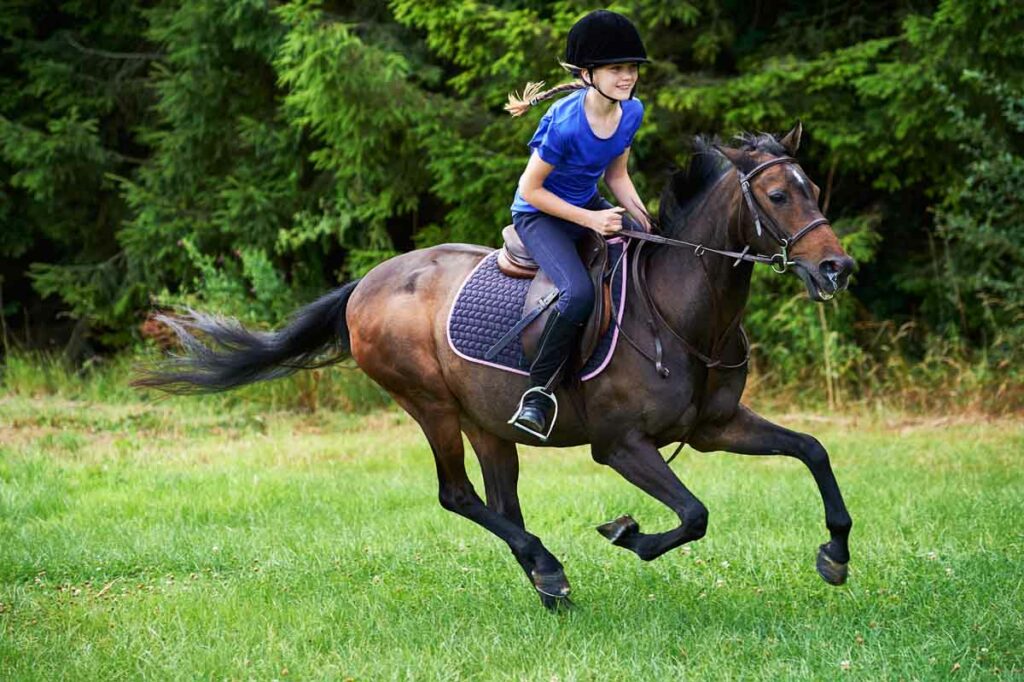
If you don’t just have the horse as a pasture ornament, you probably want to develop your skills with the horse. Whatever your discipline, riding, driving, agility, or any other form of training, you will probably need to take lessons or hire a trainer to get better. The price of these lessons varies greatly depending on the discipline, location, experience, and qualification of the trainer/riding instructor. Typically, riding lessons cost between $30 to $100.
16. Competing / Racing
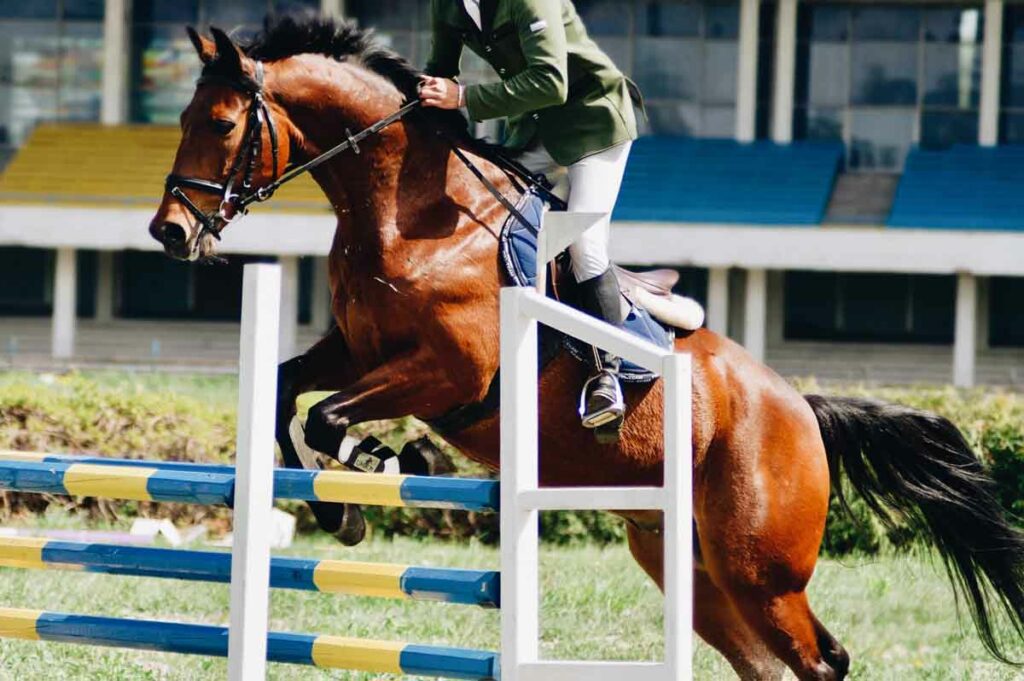
If you advance and want to join horse shows or race with your horse, you will realize that with this comes additional costs. Running in competition costs money in the form of entry fees, possible stabling fees, and transport to the competition.
To compete, you will also need to invest in special competition clothing in most disciplines. In some cases, you may also need to obtain a license at a cost to compete. The cost of horse competing can be significant, depending on the level of competition and the track or arena.
For example, a local horse show may have an entry fee of $20 per class, while a national show could have an entry fee of $200 or more per class.
17. Horse Trailer
Do you need to buy a horse trailer? Yes, it can be necessary to provide a safe and comfortable way to transport your horse from one place to another. In order to transport your horse to and from training and competitions, you will need a horsebox or horse truck.
The transport may also be needed to take the horse to the vet, pastures, etc. The price of a horse trailer can vary greatly depending on the size, style, and features that you want.
Some factors that will affect the price of your horse trailer include the number of horses you need to transport, the distance you plan on traveling, and any special features or amenities that you want.
A used transport is, of course, cheaper than a new one, but you should still expect a cost of $4,000. New horse transports and trucks can be found for around $10,000.
Another option is to rent transport if needed or to hire a transporter.
18. Massage, Chiropractic Costs
If you want to further pamper your horse, you can also regularly hire a masseur, chiropractor or other physiotherapist.
This is maybe not a necessity but many horse owners choose to spend money on this to ensure their horse receives the best possible care because they are athletes just like human athletes and need to perform at their best.
19. Taking Care of Your Horse Takes Time, and Time is Money
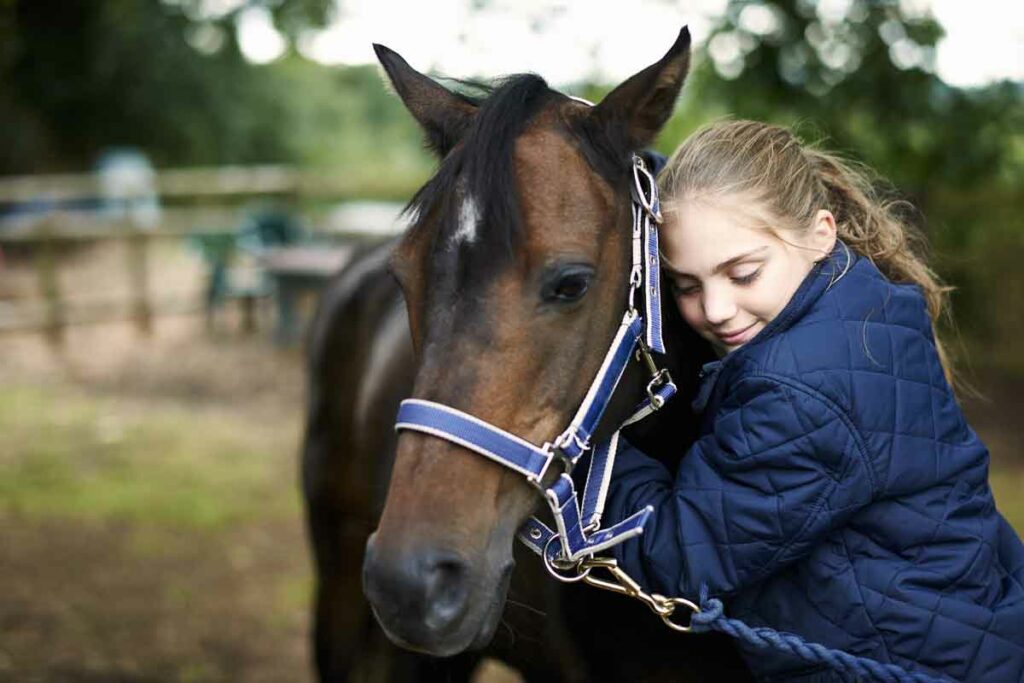
Finally, you need to consider that looking after your horse on a daily basis will cost you either your own time or you will pay someone else to look after your horse.
The horse needs to be groomed, fed, and watered and the stall needs to be mucked out. The horse needs to be inspected daily to make sure it is not injured. The horse also needs to be exercised daily to keep it happy and healthy.
If you are going away on holiday, you will need to arrange for someone else to look after your horse in the meantime. You may have a friend to help you or you may have to pay for the service.
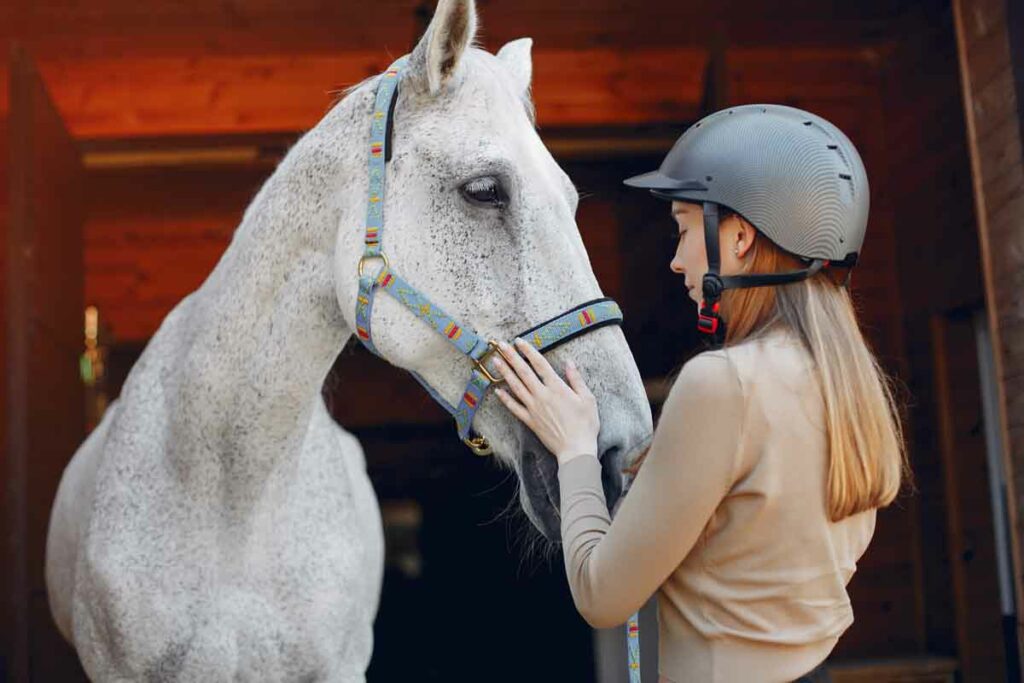
Conclusion
It is difficult to sum up the monthly/annual costs of having a horse because the amounts vary so much depending on your location, circumstances, requirements, and possibilities.
What is certain is that you need to have a good budget and a buffer in order to acquire a horse and be able to look after it in the best possible way. In conclusion, horses are expensive because of their many needs and the amount of care they require.
They are also popular pets, which drives up demand and prices. However, they’re popular for a reason, so the cost is worth it for many people simply because of the companionship and love that a horse can provide.

